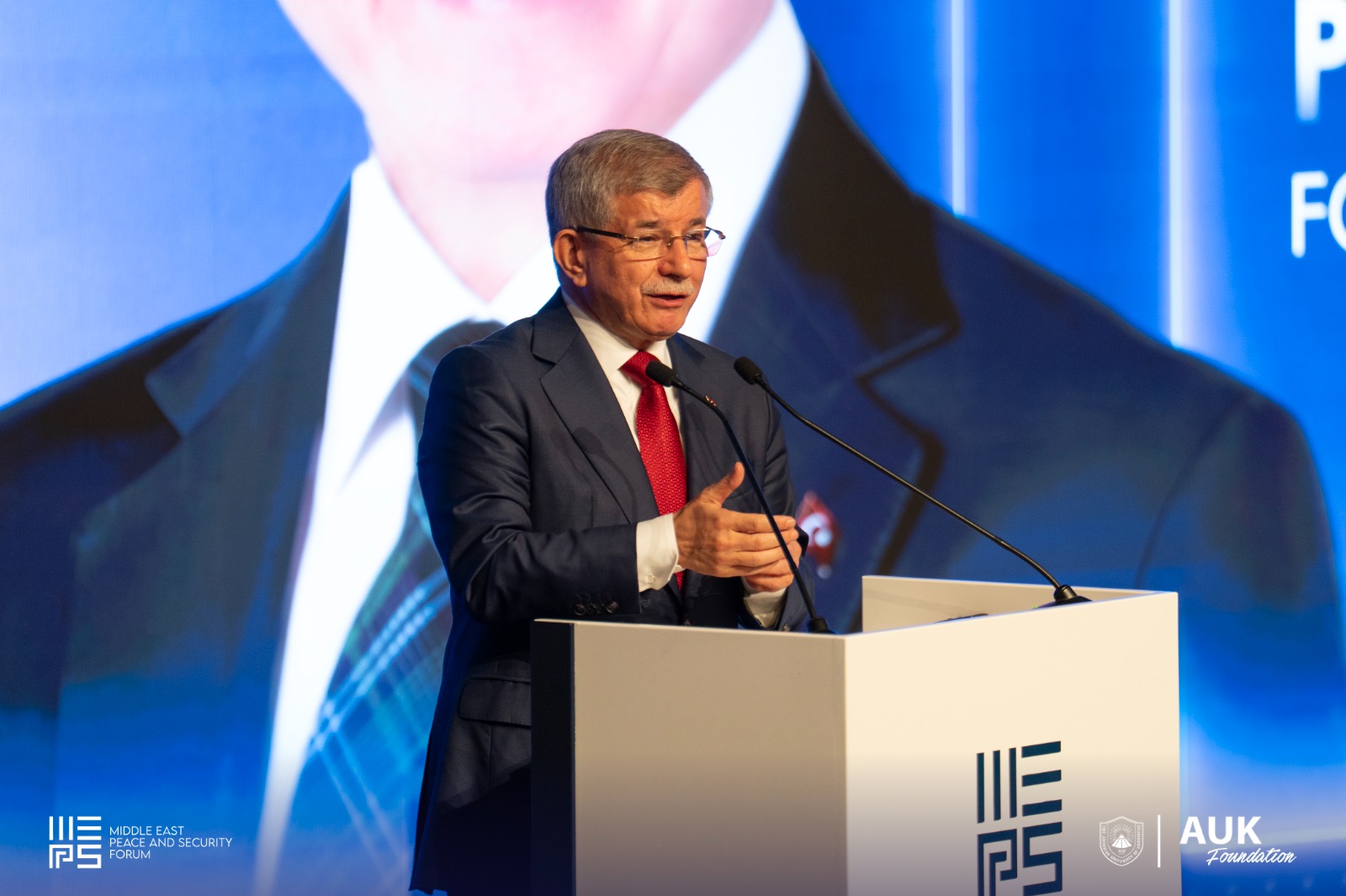Former PM Davutoglu Lauds Prime Minister Masrour Barzani's Economic Development of Kurdistan Region
At MEPS 2025, former Turkish PM Ahmet Davutoglu praised the Kurdistan Region's "remarkable" economic progress and discussed the need for a new vision to rebuild the Middle East.

ERBIL (Kurdistan24) – In a wide-ranging speech blending sharp critique with high praise, former Turkish Prime Minister Ahmet Davutoglu lauded the economic development of the Kurdistan Region, stating he was "impressed" and that Prime Minister Masrour Barzani "has achieved remarkable change."
Speaking on Tuesday, the first day of the MEPS 2025 forum, the Turkish politician and academic thanked the Kurdistan Region's leadership for organizing the event. He praised President Masoud Barzani, President Nechirvan Barzani, and specifically Prime Minister Masrour Barzani for inviting him back to the forum at the American University of Kurdistan.
Davutoglu called the timing of the conference "very appropriate," especially in the phase of "rebuilding a new Middle East" and as the "first meeting of Iraqi leaders" after the country's elections. He expressed hope for the success of the new Iraqi government's formation, stating, "This forum will be a good step for the formation of a strong government in Baghdad and good coordination with the Kurdistan Regional Government." A new government in Iraq, he added, is also important for Türkiye as it will ensure "peace and prosperity for the region, which will have a positive impact on the Turkish people."
In his remarks, Davutoglu praised the economic development projects in the Kurdistan Region, particularly in Zakho, and attributed their success to Prime Minister Masrour Barzani.
Addressing the region's perpetual state of crisis, he said, "The region is always in crisis. It is important to know how to manage crises, but for the future, we need a vision for crisis management."
Davutoglu then delivered a strong critique of Türkiye's current foreign policy. "During the Cold War, Türkiye had several principles for managing crises, but now Turkish diplomacy is wasting its energy dealing with Russia, Greece, Armenia, and the Kurdish issue in general, which is not a successful understanding." He called for resolving issues with neighbors, asserting, "It must be known that neighbors are not enemies, but a historical coexistence."
He called for a "revolution in our minds" to manage crises and build a new Middle East. Responding to President Barzani's earlier comments on the Sykes-Picot Agreement, Davutoglu said, "After 110 years, it is our right to complain about that agreement, which created instability and severed the historical and cultural ties of the region."
He argued that peace and geo-economic, geopolitical, and geo-cultural growth cannot be achieved without renewed cooperation. He called for a new strategy to counter the legacy of Sykes-Picot and warned that some parties "want to make the countries of the region smaller and more fragmented," citing Syria as an example.
Davutoglu stressed the need for Syria's territorial integrity, questioning who benefits from its division. In his view, "neither the Kurds, nor the Arabs, nor the Druze, nor the Turkmen will benefit," but only Israel, "which wants to divide and shrink the country." He concluded that if Israel wants to remain in the region, "it must respect the Palestinians."
While Davutoglu offered a sharp critique, another perspective from Türkiye was presented by Turkish MP Ferhat Nasıroğlu. In his speech, he highlighted Türkiye's efforts to strengthen peace in the region.
Nasıroğlu stated that Türkiye continuously works for ceasefires and conflict resolution, citing the Russia-Ukraine issue as an example. He also referred to an ongoing "peace process in Türkiye," which he described as "cooperation to solve problems."
He stressed that peace in the Middle East, particularly between Israel and Palestine, is in everyone's interest. "If there is a peace process, tourism and relations will improve, the energy sector will revive, and agriculture and food will be better, and this will affect everything," he said. He added that Turkish President Recep Tayyip Erdoğan is always trying to solve the problems of the Middle East.
"In the last 40 years, we have spent two billion dollars on our internal problems, so we want to fix that problem and not let it continue," Nasıroğlu concluded.
This regional dialogue on peace finds a fitting host in the Kurdistan Region, a point highlighted by Aydin Maruf, the KRG Minister for Component Affairs. Speaking to Kurdistan24, he said the coexistence of religions and nations in the Kurdistan Region is a direct result of "the role of the regional government in strengthening that coexistence."
Maruf stated that the MEPS forum is an opportunity to discuss the political and security situation of the region and affirmed that the KRG "views the coexistence of religions and nations with importance and tries to protect the rights of all components." He added, "The regional government supports efforts to strengthen coexistence and solve problems through dialogue."